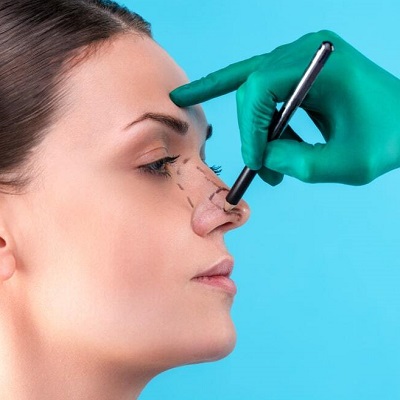
A rhinoplasty, additionally called a “nose job,” is a surgical procedure. Moreover, you can get it for both beauty and medicinal purposes. However, the purpose is to alter the nose’s form and shape. Moreover, following surgery, the face often swells, particularly around the nose, on the cheekbones, and beneath the eyes. So, How to Get Rid of Face Swelling After Rhinoplasty?
Why Does Swelling Occur After Surgery?
The body gets inflammation naturally when it is injured. During this procedure, the delicate tissues in and across the nostril are shifted around. The body responds by way of flooding the vicinity to initiate the recovery system. This accumulation of fluid causes inflammation. Though it might linger for weeks or even months, it is most evident in the days after it.
The soft elements of the face, the skin, muscles, and blood vessels cause most of the adema. The nose will enlarge, but the cheeks and eyes can surge as well. This is so because the nostril is in detail connected to different facial functions and any harm to the nose would possibly have an impact on other areas.
How to Get Rid of Face Swelling After Rhinoplasty?
If you have gone through the process or will go in the future, you should know How to Get Rid of Face Swelling After Rhinoplasty. Hence, the following are the points you must keep in your mind.
Apply Cold Compresses:
- Cold compresses on the face can reduce bruising.
- Blood vessels constrict, restricting fluid flow to the operation area.
- Place ice or cold packs on the eyes and cheeks, then wrap them in a cloth.
- Use cold clothes for the first 48 hours for optimal results.
- Keep the head elevated to prevent moisture accumulation in the face.
- Gravity draws fluids away from the face, slowing down inflamation.
Elevate Your Head:
- Put two or three pillows beneath your head while you sleep.
- Sleep in an elevated posture on a chair. Neither lay on your back nor sides for at least two weeks after it.
- Raising the head relieves facial pressure and facilitates the drainage of fluids, therefore accelerating recovery.
Stay Hydrated:
- You have to drink a lot of water to eliminate waste and surplus bodily fluids. This helps to lower edema.
- Being thirsty may aggravate adema, hence it is crucial to keep hydrated even while healing.
- Aim to drink eight to ten glasses of water daily and avoid items like coffee and alcohol that could make you thirsty.
- Staying hydrated helps your body maintain the proper balance of fluids and helps your kidneys eliminate waste, therefore lowering the tension and pain.
Avoid Strenuous Exercise:
- Avoid vigorous physical activities immediately after surgery to prevent face expansion.
- Prioritize rest and avoid activities that can strain the body.
- Avoid lifting heavy objects, vigorous exercise, or bending over for at least two weeks.
- Gradually return to regular activities as per the surgeon’s advice.
- Rest helps focus on healing and prevents edema and pressure in the face.
Follow a Healthy Diet:
- It might assist your body repair and minimize edema to eat a nutritious, well-balanced diet.
- Pick foods heavy in vitamins and antioxidants. These lower inflammations and enable tissues to recover.
- Eat plenty of fruits, vegetables, healthy grains, and lean meats among other things.
- High in vitamin C, oranges, berries, and fresh vegetables will enable your body to produce more collagen—a substance vital for healing.
- Eat less salt; this will help you to avoid aggravating edema and retain water. Steer clear of prepared dishes heavy in salt.
Take Suggested Supplements:
- Take the medicine, your surgeon recommends for you after the surgery.
- Consultation with a surgeon is advised before starting any vitamin regimen.
- Administered as advised, these supplements can speed up body healing.
Avoid Smoking and Alcohol:
- Alcohol and smoking can exacerbate edema and slow healing.
- Slow blood flow can complicate mending.
- Quitting or reducing smoking a few weeks before and after surgery.
- Avoiding alcohol during mending can prevent edema and dehydration.
Stay Patient:
Post-surgery swelling depends on the surgery and healing speed, typically reducing within two to three weeks. It’s crucial to be patient and allow the body time to recover. Weekly photographs can help monitor progress, as initial healing is transient.
Final Thoughts:
After rhinoplasty, swelling is common; yet, there are certain things you can do to speed up recovery and ensure flawless healing. Reducing the edema and other issues may be accomplished with cold packs, head elevation, plenty of fluids, avoidance of strenuous exercise, and a good diet.
For the safest procedure, post-treatment consistent follow-ups, faster recovery, and effective results consult with the best surgeon in Islamabad at Dynamic Clinic PK.



